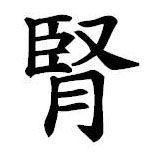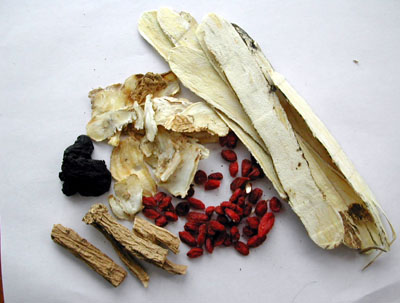

|
| The Five Phases can represent the change in seasons |
While modern man celebrates his control over his environment through technologies such as air conditioning and electric lighting, the ancient Chinese understood that we must live in harmony with the natural world in order to maintain optimal health. Over centuries of observing the world around them, the Chinese developed patterns of living according to changes in season. These observations and lifestyle customs form the foundations of Chinese medicine and can work toward sustaining good health.

|
| Han, meaning "cold," is one of the pathogens that can adversely affect our bodies |

|
| Shen are the kidneys-- the source of life. They are easily affected during the winter. |
Therefore, during the winter, it is of the utmost importance to rest and avoid cold. Some Chinese customs include:

|
|
Dang Gui Soup Ingredients: Huang Qi: 18g Dang Gui: 9g Dang Shen: 9g Gou Qi: 9g Shu Di: 9g Ox Tail: 200g
Be sure to cook in an earthenware or stainless steel pot. Do NOT use Aluminum! All ingredients available at Tan-A supermarket at Horsepen & Broad in Richmond |
- Going to bed early, waking up late. In order to conserve our energy, we should ensure that we get sufficient rest. While we set our sleeping patterns based more on schedules than on sunlight in modern societies, we can still try not to overexert ourselves through exercise or work.
- Massage Kidneys. Since we can significantly influence our Kidneys during winter, it is a good time to nourish them. First thing in the morning and before bed, massage and warm your lower back area. One simple method is gentle rubbing or using a hairdryer to warm the area. A more complicated approach involves standing with your feet shoulder width apart with your hands on your kidneys; then rotating your hips 20 times counterclockwise; then 20 times clockwise. Keep your head centered between your feet.
- Use cinnamon or ginger in cooking or drink them as teas. Both are considered to be warming, and cinnamon is believed to stoke warm Kidney energies. Doing so will aid digestion and maintain internal warmth.
- Stay warm. Keep yourself bundled up because external cold can adversely affect your internal temperature. Especially keep your abdomen covered, regardless of prevailing fashion trends.
- Avoid extremes temperature shifts. Keep your thermostat low, between 60-70. Being in an excessively warm room causes the pores of our skin to open; when we are suddenly exposed to cold, it can invade our exterior defenses.
- Avoid exertion, both mental and physical. All activities require Qi life energy; and overexertion will cause the body to tap into its kidney energy reserves which are vulnerable at this time of the year.
- Eat energetically warm foods. This will help keep your organ systems functioning so that they can generate warmth.
- Drink Fuzhou Dang Gui Soup or Jade Wind Screen Powder. Both contain Huang Qi (Astragalus), which is a strong immune booster. While Jade Wind Screen Ingredients can only be obtained through an herbalist, Fuzhou Dang Gui Soup herbs are widely available in Asian grocery stores. See recipe in the sidebar.
- Limit sexual activities. While intimacy might be warm, intercourse drains the kidney energies and is best limited during the winter months.
Acupuncture in Richmond: Traditional Asian Health Center 
HEALTH IN YOUR HANDS
FAQ